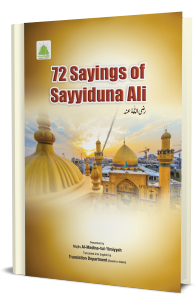Hazrat Ali - 4th caliph of Islam
The
4th caliph of Islam, Ameer-ul-Mu`mineen, Sayyiduna Maula ‘Ali Mushkil Kusha رَضِىَ اللهُ تَعَالٰی عَـنْهُ, the Lion of Allah عزّوجلّ, was born inside the Holy Kaaba on the 13th of Rajab, when the
Holy Prophet Muhammad صلی اللہ علیہ واٰلہ وسلم was 30 years old. Hazrat Ali mother name is Fatima bint e Asad and his father’s name
is Abu Taalib. He was also known by Abu Turaab, which
was given to him by the Prophet صلی
اللہ علیہ واٰلہ وسلم and He رضی اللہ تعالٰی عنہ was always happy to be addressed by it. He رضی اللہ تعالٰی عنہ embraced
Islam at the age of 10 and grew up in the household of the Holy Prophet Muhammad صلی
اللہ علیہ واٰلہ وسلم.
Throughout
his life, he actively supported and promoted the religion of Islam. Ali Ibn Abi
Talib رضی اللہ تعالٰی عنہ had a distinguished reputation for being
among the early Muslim immigrants and the ten companions promised paradise,
possessing many remarkable qualities. He رضی
اللہ تعالٰی عنہ displayed exceptional bravery
in significant battles such as Badr, Uhud, and Khandaq. His unique sword, named
Zulfiqar, played a crucial role in defeating numerous renowned and brave
warriors among the unbelievers (Kuffar).
The
Kunyah (Teknonym) of Sayyiduna ‘Ali-ul-Murtada کَـرَّمَ
الـلّٰـهُ تَـعَـالٰی وَجۡـھَـهُ الۡـکَـرِیۡم is ‘Abul
Hasan’ and ‘Abu Turaab’. He رضی اللہ تعالٰی عنہ is the
paternal cousin of the Beloved Prophet صلی
اللہ علیہ واٰلہ وسلم. He رضی اللہ تعالٰی عنہ remained the caliph for 4 years, 8 months
and 9 days. [1]
Upbringing, title and Kunyah:
Khalifah
Ali Ibn Abi Talib رضی اللہ تعالٰی عنہ grew up under the care of Prophet Muhammad صلی اللہ علیہ واٰلہ وسلم. Since childhood, he was in the blessed
company of the Prophet صلی اللہ علیہ واٰلہ وسلم and learned good habits by listening to his
talks. He رضی اللہ تعالٰی عنہ. always avoided idol worship and earned the
titles 'Abul Hasan' and 'Abu Turab.'
Imam
Ali رضی اللہ تعالٰی عنہ was the youngest of four brothers. His
siblings, Sayyiduna ‘Aqeel, Sayyiduna Ja’far, Sayyidah Umm-e-Haani, and
Sayyidah Jumanah رَضِیَ اللہ تَعَالٰی
عَنْهُم,
also embraced Islam. Hazrat Ali’s رضی
اللہ تعالٰی عنہ, entire life is full of the faith-refreshing parables of
devotion to the Noblest Prophet صلی
اللہ علیہ واٰلہ وسلم. It was Sayyiduna ‘Ali کَـرَّمَ
الـلّٰـهُ تَـعَـالٰی وَجۡـھَـهُ الۡـکَـرِیۡم who had the privilege to lie down in the bed
of Beloved Prophet after He صلی اللہ علیہ واٰلہ وسلم had gone in
the night of migration.
The names of the ‘Asharaĥ
Mubashsharaĥ:
Amir-ul-Muminin
Ali bin Abi Talib کَـرَّمَ الـلّٰـهُ
تَـعَـالٰی وَجۡـھَـهُ الۡـکَـرِیۡم is also among the ten companions given the
good news of Paradise. The term 'Asharaĥ Mubashsharaĥ' refers to ten companions
رضي الله تعالٰی عنهم who were specifically promised Paradise by
the Prophet Muhammad صلی اللہ علیہ واٰلہ وسلم. According to Sayyiduna Abdur Rahman Bin
'Awf رضی اللہ تعالٰی عنہ, the Prophet صلی اللہ علیہ واٰلہ وسلم mentioned that Abu Bakr, Umar, Usman, Ali,
Talha, Zubayr, Abdur Rahman Bin 'Awf, Sa'd Bin Abi Waqqas, Sa’id Bin Zayd, and
Abu 'Ubaydah Bin Jarrāḥ (رضوان الله تعالى علیھم
اجمعين) are
destined for Paradise. [2]
Hazrat
Ali Ibn Abi Talib کَـرَّمَ الـلّٰـهُ
تَـعَـالٰی وَجۡـھَـهُ الۡـکَـرِیۡم had a moderate height, large eyes, and an
exceptionally blessed face resembling the full moon. His broad shoulders, heavy
palms, and strong hands made him robust. He had a slender neck, dark hair at
the back of his head, and a flowing, naturally dark beard.
Hazrat Ali's رضی اللہ تعالٰی عنہ love
for the Prophet صلی اللہ علیہ واٰلہ وسلم:
Ameer-ul-Mu'mineen
Sayyidina Ali bin Abi Thalib کَـرَّمَ الـلّٰـهُ
تَـعَـالٰی وَجۡـھَـهُ الۡـکَـرِیۡم, deeply loved and obeyed the Beloved Prophet
Muhammad صلی اللہ علیہ واٰلہ وسلم. When asked about his love for the Prophet صلی اللہ علیہ واٰلہ وسلم, he رضی
اللہ تعالٰی عنہ replied, 'I swear by Allah عزّوجلّ! The Prophet صلی اللہ علیہ واٰلہ وسلم is more
beloved to us than our wealth, children, parents, and even cold water when
we're extremely thirsty.' [3]
Hazrat Ali family tree:
·
How many sons and
daughters did Hazrat Ali رضی اللہ تعالٰی عنہ have??
Sayyiduna
'Ali رضی اللہ تعالٰی عنہ couldn't marry again while Sayyidah Fatimah رضی اللہ تعالٰی عنها was alive. However, after her passing, he رضی اللہ تعالٰی عنہ married several times, having 14 sons and 18
daughters. Sayyidah Fatimah رضی اللہ تعالٰی عنها gave birth to Imam Hasan, Imam Hussain,
Mohsin, Zainab, and Umm-e-Kulsoom رَضِیَ
اللہ تَعَالٰی عَنْهُم. Sayyiduna Mohsin passed away in his childhood. [4]
Deep affection for the family:
One
day the Beloved Rasool صلی اللہ علیہ واٰلہ وسلم visited the blessed house of Sayyiduna ‘Ali رضی اللہ تعالٰی عنہ. He صلی
اللہ علیہ واٰلہ وسلم asked [Sayyidah Fatimah رضی
اللہ تعالٰی عنها], ‘Where are my children (i.e., Hasan and Hussain)?’ Sayyidah
Fatimah رضی اللہ تعالٰی عنها humbly said: When we woke up in the morning
today, we had nothing to eat. Children’s father took them out saying, ‘If they
remain in the house, they would weep in front of you and you have nothing to
give them for eating. So, he has gone to so and so Jew’. The Beloved Rasool صلی اللہ علیہ واٰلہ وسلم went there and saw that both the children
were playing with a clay flask; some leftover dates were lying there in front
of them. The Beloved Rasool صلی اللہ علیہ واٰلہ
وسلم said,
‘Ali! Take the children to home before it gets sunny and hot.’ Sayyiduna ‘Ali رضی اللہ تعالٰی عنہ humbly said, ‘O Beloved Rasool صلی اللہ علیہ واٰلہ وسلم! We have not had even a single piece of
grain at home since morning. If you sit for a while, I will collect some
leftover dates for Fatimah.’ Having listened to this, the Beloved Rasool صلی اللہ علیہ واٰلہ وسلم sat there. Sayyiduna ‘Ali رضی اللہ تعالٰی عنہ collected some dates and wrapped them in a
piece of cloth. [7]
Sayyiduna Ali's رضی اللہ تعالٰی عنہ Leadership and Wisdom:
A
Yemeni man sent his son on a journey with a slave. They argued, and in Kufa,
the slave falsely claimed the boy was his. To settle the matter, Caliph Ali کَـرَّمَ الـلّٰـهُ تَـعَـالٰی وَجۡـھَـهُ الۡـکَـرِیۡم had them put their heads through holes in
the wall. He then brought the Holy Prophet's صلی
اللہ علیہ واٰلہ وسلم sword and ordered to cut the slave's head. The slave pulled
back, but the boy remained, proving his true identity.
Sayings of Ali ibn Abi Talib:
Sayyiduna
Ibn-e- ‘Abbas رضی اللہ تعالٰی عنها narrated, Ameer-ul-Mu`mineen Sayyiduna ‘Umar
Farooq-e-A’zam رضی اللہ تعالٰی عنہ has stated: Sayyiduna ‘Ali کَرَّمَ الـلّٰـه وَجہہُ الْکریم has stated such a beautiful saying that if
people act upon them, they attain success and never indulge in evil acts.
People humbly asked, ‘O Ameer-ul-Mu`mineen! What are those sayings? He رضی اللہ تعالٰی عنہ replied: These are the sayings to take
lessons from:
Hazrat
Ali quotes in English are as follows:
1.
Take care of the likes of your brother, treat him well then you will attain
your favourite thing from him.
2. And
do not have an evil suspicion about a word that comes out of your brother (seek
the positive aspect) you must form a good opinion out of it.
3. Of
two acts, never indulge in that which makes you follow your Nafs (self) because
following the Nafs is pure loss.
4.
Whenever you want your need to be fulfilled then recite abundant Salat upon the
Blessed Rasool صلی اللہ علیہ واٰلہ وسلم before making du’aa. Undoubtedly, Allah عزّوجلّ favours that person who asks for his needs; if whoever asks for
those things then Allah عزّوجلّ bestows him whatever is better for him and
prevents those things which are harmful for him.
5.
Whoever wants to be absorbed in the remembrance of Allah عزّوجلّ, he should make Zikr his habit and custom and have patience in
each trouble & misfortune.
6.
Whoever longs for a long worldly life, he should be prepared to face troubles.
7.
Whoever wants to retain his honour and prestige, he should refrain from showing
off.
8. Do
not ask questions about which you have nothing to do with.
9.
Care for your health before your illness and make good use of your spare time
otherwise you will face anxiety and grief.
10.
Steadfastness is half of success like sadness is half of old age.
11.
When a thing disturbs your heart, abandon it, because peace lies in abandoning
that thing. [9]
Caliphate of Ali ibn Abi Talib:
Once,
a man was brought before Sayyiduna Ali کَـرَّمَ
الـلّٰـهُ تَـعَـالٰی وَجۡـھَـهُ الۡـکَـرِیۡم on the charge of stealing and two witnesses
were present there to testify. Meanwhile, Sayyiduna Ali کَـرَّمَ الـلّٰـهُ تَـعَـالٰی وَجۡـھَـهُ الۡـکَـرِیۡم was attending to some other tasks. Then he کَـرَّمَ الـلّٰـهُ تَـعَـالٰی وَجۡـھَـهُ الۡـکَـرِیۡم said, ‘I have always punished the man
severely whenever he happened to be a false witness.’ (Later on) When he کَـرَّمَ الـلّٰـهُ تَـعَـالٰی وَجۡـھَـهُ الۡـکَـرِیۡم summoned the two witnesses, it turned out
that both had run away. Therefore, he acquitted the accused. [10]
Ali ibn Abi Talib Shahadat:
On the
Friday night of the 17th or 19th Ramadan in the year 40th Hijri,
Amīr-ul-Mu`minīn, Sayyidunā ‘Alī رضی
اللہ عنہ
woke up at dawn, answered the call to prayer, and headed to the Masjid for Fajr
prayer. While on his way, he was suddenly attacked by Ibn Muljam, a notorious
assailant, who fatally wounded him with a sword. The people rushed to apprehend
the attacker, and after two days, on 21st Ramadan-ul-Mubārak, Sayyidunā ‘Alī رضی اللہ عنہ got Shahadat. [11]
References:
1.
(Usd-ul-Ghabah, vol. 4,
p. 100; Tareekh-ul-Khulafa, pp. 132-139; Khulafa-e-Rashideen, p. 313).
2.
(Jāmi’ Tirmiżī, vol. 5,
pp. 416, Ḥadīš 3768).
3.
(Ash-Shifa, vol. 2, pp.
22)
4.
(Riyad-un-Nadarah, vol.
2, pp. 239).
5.
(Az-Zuhd li Ahmad, pp.
157, Raqm 696).
6.
(Ibn Abid Dunya, vol. 4,
pp. 127, Raqm 281).
7.
(Al-Mu’jam-ul-Kabeer,
vol. 22, pp. 422, Hadees 1040).
8.
(Musnad Ahmad, vol. 1,
pp. 223, Hadees 819; Al-Mu’jam-ul-Kabeer, vol. 24, pp. 137, Hadees 365).
9.
(‘Uyun-ul-Hikayat, pp.
173)
10.
(Musannaf-e-Abi Shaybah,
vol. 14, pp. 548, Raqm 29426).
11.
(Tārīkh-ul-Khulafā, pp.
139).










.webp)
.webp)

















